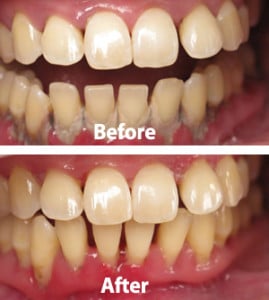Do you have Periodontal Disease Symtoms?
Periodontal Disease Symptoms - Austin Laser Dentist

Periodontal disease, or gum disease, affects millions of adults each year. Resulting from an accumulation of bacteria in the gum and surrounding tissue, the disease can cause gum recession, bone degeneration and tooth loss. Although periodontal disease has a number of common side effects, these often appear in the later stages. For optimal health, you should receive biannual exams and frequent professional cleanings. Dr. Helen E. Ragsdale can look for early periodontal disease symptoms at Austin Laser Dentist. When she detects the disease early on, she can provide timely and highly effective treatment to save your smile.
What Is Periodontal Disease?
Plaque is a sticky, colorless film that may develop on the surface of your teeth, particularly near your gum line. It harbors the harmful oral bacteria responsible for dental decay. Even if you brush and floss daily, plaque and bacteria can still accumulate on your teeth. The plaque will eventually harden into tartar, and the bacteria will spread below your gum line. As the bacteria multiply, they will cause swelling and inflammation, and they will create pockets in your soft tissues. Your gums will then begin to separate from your teeth, leading to tooth loss and a host of additional symptoms.
Common Signs of Periodontal Disease
If you notice any of the following symptoms, it may indicate the presence of gum disease:
Abscesses are another common symptom of periodontal disease. These sores occur when bacteria become trapped under your gum tissue. Because the bacteria cannot escape, the abscess grows rapidly, causing moderate to severe discomfort. In some cases, you may also have a discharge of pus in between your teeth. If left untreated, a dental abscess can pose a serious health risk requiring emergency medical care. Yes, it can kill you.
Periodontitis: The Silent Disease
Gum disease is called the “silent disease” because it often has very few symtoms in the early stages. By the time patients notice the symptoms listed above, the disease has significantly progressed. As a result, patients may require gum surgery and extensive restorative treatment. Because of the silent nature of the disease, it is important to schedule regular dental appointments. At your biannual exams, Dr. Ragsdale will monitor your gums and overall oral structure to look for early warning signs. In the initial stages, known as gingivitis, she may be able to treat your condition with a thorough dental cleaning.
Gingivitis is easily treatable. However, gum disease is a chronic condition for which there is no cure. The condition may go into remission, but you will eventually suffer another bout of tissue degeneration. Although Dr. Ragsdale can treat your disease and restore lost teeth, it is vital to be proactive about your dental health. Scheduling routine exams will allow Dr. Ragsdale to look for a recurrence of disease and catch a deteriorating situation as early as possible.
Diagnosing Periodontal Disease?
At each of your exams, Dr. Ragsdale will look for the signs of gum disease that are only apparent to a dental professional. These signs include:
Periodontal pocket
Unless the pockets become abscessed, you will probably not know that pockets have formed in your soft tissues. However, Dr. Ragsdale can detect these pockets with a simple manual test.
Loose or shifting teeth
In many cases, you may not notice if you have loose teeth. Similarly, you may not be aware if your teeth have started to shift or flare outwards, often these changes occur slowly. Only a dentist will be able to detect the minor tooth movements that may signal gum disease.
Bone degeneration
An x-ray reveals the overall structure of your jaw. With regular x-rays, Dr. Ragsdale can detect gradual changes, such as a loss of crestal bone.
Once she has a complete understanding of your symptoms and the severity of your gum disease, Dr. Ragsdale can determine the right treatment for your needs. She uses advanced lasers to perform various treatments, ranging from scaling and root planing to advanced bone grafting surgery.
Schedule a Consultation
If you manifest the symptoms of gum disease, or if you have not had a recent dental exam, take the necessary steps to protect your smile! Call 512 346-4690 today to schedule your appointment with Dr. Ragsdale. We proudly serve Austin, Round Rock, and greater Austin area.
